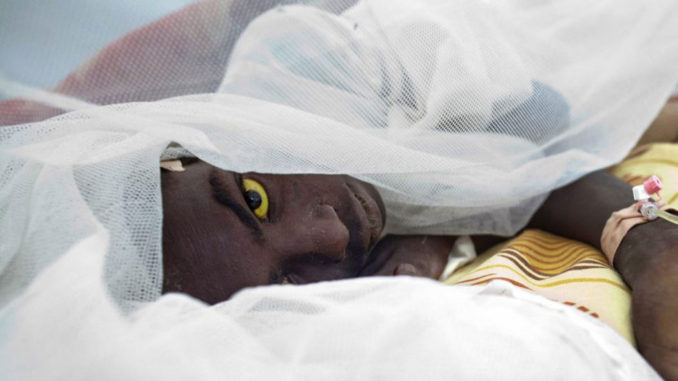
Recently, the Nigeria Centre for Disease Control (NCDC) informed that 20 persons died of yellow fever outbreak in Ebonyi State.
Health experts describe Yellow fever as an acute viral haemorrhagic disease that is transmitted by aedes and hemagogues mosquitoes. The causative agent is an arbovirus from the flavivirus family.
Professor of Paediatrics and Child Health, Faculty of Clinical Sciences, Obafemi Awolowo University, Ile-Ife, Ebunoluwa Aderonke Adejuyigbe said the aedes mosquito that transmits the disease also transmits Zika and dengue viruses. It breeds in water in tree holes in the forests, where it bites human and non-human primates.
She said: “The mosquito is also found in uncovered water reservoirs in communities and urban areas, where it breeds and bites humans. However, immunisation protects exposed humans, while unimmunised individuals come down with the disease.
“Unimmunised tourists, forest workers, farmers and campers bitten and infected in the forests and jungles become sources of transmission, when they return to their towns, cities and villages. Infants and children are at higher risk of contracting the disease than adults. A case of mother-to-child transmission has also been reported. There is also potential risk of transmission through blood transfusion and needlepoint injuries, especially during epidemics.
“The symptoms and signs of yellow fever infection in most people are clinically not apparent, presenting with fever alone or with headache. For people who develop symptomatic illness, the incubation period is typically three to six days. The first phase of the illness presents as a nonspecific influenza-like syndrome, with sudden onset of fever, chills, headache, backache, myalgia, prostration, nausea, and vomiting, which resolves in most patients. However, 15 per cent of these patients enter a more serious or toxic form of the disease, characterised by jaundice, bleeding, and eventually shock and multisystem organ failure 48 hours after the initial improvement.”
She explained that the bleeding in patients manifests as hematemesis, melena, metrorrhagia, hematuria, petechiae, ecchymoses, epistaxis, and oozing blood from the gingiva and needle-puncture sites.
She said: “The case-fatality ratio for severe cases, when the kidney or liver is affected is 20 to 50 per cent. There is no specific effective antiviral drug against yellow fever virus. Hence, treatment is supportive and involves prompt treatment of symptoms as they manifest. For instance, if the bleeding becomes severe, the patient can be given blood transfusion. If there is kidney failure, dialysis can be done
“The most effective prevention strategy is yellow fever immunisation, which is free, safe and provides life-long immunity. It is given as part of routine childhood immunisation and to travellers from low-risk countries. It is also given to large populations, affected by yellow fever epidemic (mass vaccination).
“Another prevention modality is the control of mosquito population, by draining collections of water where the mosquitoes breed in neighbourhoods, applying larvicides to kill the young mosquito larva, application of insecticide in homes, personal prevention from mosquito bites by wearing long clothing that covers the ankles and wrists and usage of insecticide treated nets.
The final prevention, she said is emergency preparedness by effective surveillance of yellow fever outbreaks and prompt response by mass vaccination campaigns and treatment of infected patients.
“Government’s efforts are the cornerstone key to prevention by ensuring sustenance of routine immunisation of infants, as epidemics would not occur, if over 80 percent of the population are immunised. There should be effective disease surveillance and availability of confirmatory diagnostic laboratories, instead of having to send samples to Dakar, Senegal for confirmation. Also, prompt response should be given outbreaks by conducting mass vaccination campaigns and treating infected individuals,” she added.
She underscored the need for educational campaigns during outbreaks, so that infected individuals can quickly identify the symptoms and present at a health facility. Another area is improving health workers’ skills during outbreaks in disease identification and management by brief refresher trainings.
She, therefore, advised the public to take advantage of government’s efforts at immunisation of infants and adults.
She said: “People should also ensure they get immunisation, when travelling to countries with previous outbreaks. There is need to deprive mosquitoes of breeding spots in the neighbourhoods, for instance, by discarding empty cans, containers, water puddles and spray larvicides into those that cannot be drained.
“Personal prevention from mosquito bites is done by applying mosquito repellent creams and wearing long covering clothing, especially in the evenings and when on camping trips. There is need for prompt presentation to health facility, when having suggestive symptoms.”
Dr. Modupe Akinyinka, a Senior lecturer and Consultant Public Health Physician at the Department of Community Health and Primary Health Care Lagos State University College of Medicine, said: “A more severe case can be confused with severe malaria, leptospirosis, viral hepatitis, especially fulminant forms, other haemorrhagic fevers, infection with other flaviviruses, such as dengue haemorrhagic fever, and poisoning.
“Polymerase chain reaction (PCR) testing of blood and urine can sometimes detect the virus at early stages. In later stages, testing to identify antibodies is needed. However, underreporting is a concern, as the true number of cases is estimated to be 10 to 250 times what is now being reported.”
Akinyinka noted that the World Health Organisation (WHO) recommends that every at-risk country has at least one national laboratory, where basic yellow fever blood tests can be performed.
“A confirmed case of yellow fever in an unvaccinated population is considered an outbreak. A confirmed case in any context must be fully investigated. Investigation teams must assess and respond to the outbreak with both emergency measures and longer-term immunisation plans,” she said.
END

Be the first to comment